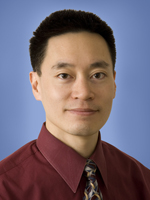
| |
| calendar |
| speakers |
| resources |
| blog |
| contact |
| Edward Hsiao, M.D. Ph.D. |
Marin Science Seminar Presentation: “Hormones and Genetics in the Skeleton: From Bones to Stem Cells and Back Again” Download the flyer. (February 29, 2012) Interview with Dr. Hsiao by MSS intern Julia Moore Musculoskeletal disorders affecting the bones and joints are a growing health problem. Skeletal dysplasias affect 1 in 4,000 births. While 55% of affected pregnancies end in death, the surviving children often have severe complications such as physical disabilities, deformities, paralysis, and fractures. In adults, osteoporosis affects over 10 million people in the United States and results in over 2 million fractures each year. Unfortunately, our ability to effectively prevent or treat any of these conditions is still very rudimentary. In this seminar, we will touch upon the medical challenges facing skeletal diseases and bone repair and some of the new innovations in medical research that are helping bridge lab research and finding new treatments for human skeletal diseases. Dr. Hsiao’s research is driven by a desire to understand how major hormonal and regulatory pathways determine the specification, differentiation, and morphogenesis of key tissues such as bone, cartilage, muscle, and fat. Mis-regulation of these pathways leads to significant medical diseases, including the inappropriate formation of mineralized tissues such as in atherosclerosis or heterotopic ossification. His laboratory uses a number of cutting-edge techniques, including “artificial hormone” systems to study how one class of hormone signals (G-protein coupled receptors, GPCRs) affects skeletal tissues, and human induced pluripotent stem (iPS) cells to study genetic diseases affecting bone and cartilage. Ed Hsiao received his BA magna cum laude in biochemistry and molecular biology from Harvard University. He completed his MD and PhD at the Johns Hopkins Medical School studying hormone signals in tissue injury and repair. After completing his internal medicine residency at Johns Hopkins, Ed came to UCSF for an endocrinology fellowship where his research has focused on the roles of hormones and genetics in skeletal diseases. He is currently an Assistant Professor at UCSF in the Division of Endocrinology and Metabolism and in the Institute for Human Genetics. Ed’s research is supported by grants from the NIH, CIRM, the Sandler Foundation, and the National Osteoporosis Foundation. |

Hormones and Bones in the Skeleton teaser video by MSS intern Julia McKeag on Vimeo.
Dr. Hsiao's Page at UCSF's Dept of Craniofacial & Mesenchymal Biology
